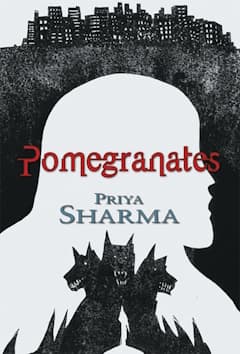
Pomegranates by Priya Sharma
(Absinthe Books, 2023)
Reviewed by Jamie Mollart
Pomegranates falls nearly into two literary trends which will hopefully lend it the success it richly deserves. As a retelling of a classic Greek myth, it calls to mind the successes of Madeline Miller’s ‘Circe’, ‘Ariadne’ by Jennifer Saint and ‘Ithaca’ by Claire North. And elsewhere I’m seeing an enjoyable trend for novellas, so it’s especially gratifying to read one in a space which has traditionally been all about length and scope.
That said, this novella is a deceptively simple piece of work, packing so much into its limited palette that it somehow feels epic despites its slight page count. The plot is taut and crisp. The construction elegant and elusive. The brilliant writing, while sparse, is still redolent with imagery, mystery and portent. Meaning the whole packs much more of a punch than its size would suggest.
Priya Sharma has a masterly control of this type of fiction. Her short stories have appeared in Black Static, Nightmare, The Dark and Tor. Her first novella, Ormeshadow, won a Shirley Jackson award and a British Fantasy Award for short fiction and was a 2022 Grand Prix de l’Imaginaire finalist.
All this experience is evident in Pomegranates; from the first page you know you’re in safe hands, and that feeling doesn’t leave as you read—there is no wastage and not a single sentence is out of place.
Pomegranates reimagines the classic Greek myth of Demeter, Persephone and Hades, but it’s much more than that. It’s an expansion of the myth, which at the same time feels intimate, bringing the Gods to a level of a (very) dysfunctional family operating in a modern world firmly in the thrall of climate change. A climate change caused by the squabbling Gods stopping doing their jobs and instead live amongst human society, it being the implication of them exacting revenge for the ills done against them by each other and humanity.
The narrative is split between three women: Doctor. A. Ursa (also known as Bear); Demeter, the Corn Mother; and Persephone, now Queen of the Underworld. Their stories intertwine and circuitously overlap in an enviably skilful manner, interrupted at various points by a Greek chorus of voices, who ruminate on femininity, myth and legend, and the relationship between humanity and religion.
Dr Ursa works at the Swedish University of Agricultural Sciences, where she oversees a project to create a seedbank to safeguard the plant life of the planet from the persistent winter. We follow Dr Ursa as she wanders into the underworld and finds an angry Persephone in charge following Hades’s death. She tries to convince Persephone to return to Earth to bring about Spring, and at the same time Persephone recounts the story of how she ended up as queen of the underworld and how she lost Hades (the cause of her vengeance).
Demeter is held in a mental institution and is undergoing therapy for what the doctors mistakenly believe is a delusion. She talks to Dr Protheroe explaining how she is searching for her daughter, also to convince her to return and bring an end to the winter. She also expands on her family life, where the Gods we know from mythology are recast as a squabbling, sociopathic family reminiscent of the Roy family from Succession.
To break the narrative down like this simplifies the structure, they’re more cleverly interwoven than I’m doing justice, each one cropping up in the other, each one representing and playing thematically off the other.
This is a novella rich in imagery and metaphor, seeds particularly run throughout the stories as a thematic motif, Dr Ursa’s seedbank representing hope and rebirth, the pomegranate seeds (important in the original myth) that Persephone eats in Hades binding her there and representing promise of change.
And it’s this richness that makes this short book so remarkable. Priya Sharma does more in 101 pages than most writers can do in 500.
Review from BSFA Review 21 - Download your copy here.
